
RIO DE JANEIRO — Several incidents have raised new concerns over security at Rio’s Olympic Games, including a fierce gun battle in a North Rio community that visitors pass on their way from the airport to the main Olympic Park, and a bus carrying journalists from an Olympic park had its windows shattered by “projectiles.”
These were just the latest scares to rock the Olympics. Last week, gunmen waylaid three Swedish tourists outside another gang-run community in a different area and on Aug. 6, Portugal’s education minister was robbed at knife point at the lagoon were Olympic rowing races are being staged.
Police officers from from Brazil’s National Force — an equivalent to the National Guard — were fired at in a North Rio favela on Wednesday. One was hit in the head and has been operated on, Allan de Carvalho, a Ministry of Justice spokesman, said in an email.
Wednesday began with violence when a fierce gun-battle rattled Complexo do Alemão, a low-income community called a favela. Residents were unable to get to work and a cable car that goes to the area stopped service.
Mariluce Mária, 34, who lives in the area said a local woman had been shot in the shoulder and blamed police, who were fighting with gang members. “This is a war over territory,” she said.
In 2008, Rio started installing police bases in favelas controlled by drug gangs. Two years later the Complexo do Alemão was occupied by the Brazilian army while millions watched live on television.
The strategy worked for a few years, as crime dropped. But in the run-up to the Olympics, the program has begun disintegrating in many favelas like this. This was the third gun battle in eight days in this favela alone.
A police spokeswoman said in an email that officers from a base in the community were fired on by “armed criminals” in a local square. A female resident was injured and taken to the hospital. The spokeswoman did not give her name in line with internal regulations.
“There was a confrontation,” she said. “Policing in the area was reinforced.”
Yet a few hours later, there were no sign of any policing on Alvorado Street and in Samba Square where the battle had taken place. Nor was there nobody outside a nearby police base.
Young men from a drug gang patrolled openly with automatic weapons. One of their number, a young man with a radio, agreed to speak to The Washington Post on the condition of anonymity.
He said the police had provoked the morning shootout. “The police wanted to get to a place they can’t go,” he said. He pointed to the alley behind him, which was riddled with bullet holes, as were many of the walls in the area.
The gang that controls this favela is called the Red Command and has traditionally fought with other Rio drug gangs as well as police. At present, the different factions are not fighting each other, the gang member said.
“There is no truce. But now our fight is with the state,” he said.
Behind him, a nervous-looking teenage boy held an automatic rifle, a young man raised an AK-47 in camouflage colors in the air with a smile, and a youth in a baseball cap rested the barrel of his rifle on his flip-flop.
There was another gun battle on Aug. 3, and yet another on Aug. 5, a few hours before Olympic Opening Ceremonies left tens of thousands spellbound at the Maracanã stadium. The second battle sent Mariluce Mária’s mother Ivania Soares, 52, and her family, who live down a steep alley nearby, fleeing for the bathroom for safety.
“We are inside a war,” she said. “It is constant here.”
Her grandson Danilo de Souza, 14, said like the rest of the family, he had no interest in the Olympics and had not even watched it.
“It’s a total mess,” Danilo said.
Hours earlier and miles away in West Rio, two windows on a media bus were broken as it carried journalists from one of the Olympic venues back to the main media center at the Olympic Park.
Olympics organizers said the bus was hit by rocks on Tuesday — and not by bullets, as witnesses have suspected. Luiz Fernando Correa, the head of security for the Rio organizing committee, described it as an “unfortunate event.”
“Stones were thrown and hit the metal part and windows of the bus,” he said at a news conference on Wednesday.
“We understand that some of the journalists have minor injuries,” Rio 2016’s director of communications, Mario Andrada, told reporters.
The bus was returning from Deodoro, an Olympic hub where events like archery, equestrian, field hockey, and rugby are held, at about 7:30 p.m. when one or more projectiles shattered two windows.
Some people on the bus said it was hit with bullets and said they heard the sound of gunfire.
“There was kind of a popping noise and something hit two windows on the side of the bus and left two hole marks, which looked like bullet holes,” David Davies, a photographer for the British-based news agency Press Association, told the Associated Press.
But Olympic organizers disputed this.
“It was a stone. It was a rock,” Correa said. He said that Brazilian security forces would deploy additional police and intensify patrols along Olympic bus routes in an attempt to avoid future incidents.
[Source: Washington Post]




